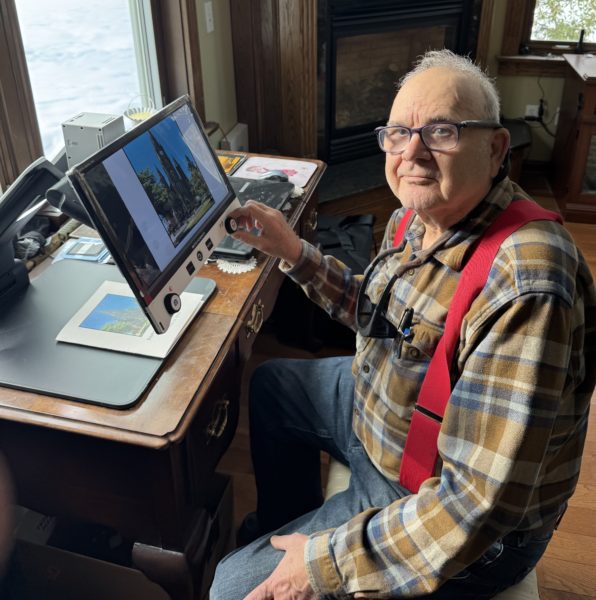

Erie Retina Research Collaborates with Sight Center of NWPA to Support Low Vision Clinic
April 24, 2025
Erie, PA – Sight is not just a sense, but a gateway to opportunity—an essential key that unlocks doors to learning, independence, and connection. For those with low vision, these doors can often seem closed, making it harder to access resources, navigate the world, or enjoy one of their favorite hobbies. This challenge isn't just about seeing the world around them—it's about being seen, understood, and given the tools to thrive.
In 2023, Erie Retina Research, under the leadership of ophthalmologist and retina specialist Dr. David R.P. Almeida, MD MBA Ph.D, partnered with The Sight Center of NWPA to establish the Erie Retina Research Low Vision Clinic after a three-year hiatus in specialized low vision optometry services in our community. Dr. David Almeida sought to ensure that patients with low vision could receive comprehensive care at no cost. Erie Retina Research stands at the forefront of ophthalmic innovation, proudly conducting an extensive range of clinical trials and providing patients with access to compassionate, high-quality eye care at no cost. Through the Low Vision Clinic collaboration, patients receive exams and specialized support, where a team of experts works to improve the quality of life for those with vision impairments. Patients are then referred to The Sight Center, where they have access to a range of support services, to ensure continuity of care.
As part of their ongoing commitment to supporting those with profound and irreversible vision loss, Erie Retina Research provides low vision devices and glasses for patients and has secured significant funding for the project. Patients at the clinic have benefitted from tailored assessments that match their specific needs. Devices such as handheld magnifiers, tabletop magnifiers, and specialized glasses prescribed by optometrists have enabled individuals to engage in activities such as reading newspapers, writing checks, crafting, and managing daily chores like setting alarm clocks and reading labels when grocery shopping.
The results have been overwhelmingly positive, with 100% of respondents reporting that the low vision devices they received significantly improved their daily lives. Additionally, 33% of patients were connected to additional resources at The Sight Center, such as transportation assistance.

When Dr. Philip Susann visited the Low Vision Clinic at The Sight Center for a low vision examination, his eyesight was significantly impaired. Dr. Susann received a diagnosis of keratoconus in 1974 and received his first corneal transplant in 1999, followed by repeat transplants in 2013, 2017, and 2021. He also underwent cataract surgery and now receives ongoing management of his glaucoma. After a thorough low vision evaluation at the Low Vision Clinic, Dr. Susann was recommended a CCTV device to help with daily tasks. The CCTV device is a video magnifier that projects a magnified image of any flat object, such as a newspaper, onto a computer screen. Dr. Susann shared that receiving the CCTV device has made “the impossible, possible again.” He is now able to read once more, write checks, and carry out other essential tasks with newfound independence. The Low Vision Clinic is thrilled to have played a role in improving Dr. Susann's quality of life through the use of assistive technology
Erie Retina Research received funding from The Erie Community Foundation’s Helping Today grant, which laid the groundwork for ongoing service expansion. "The grant from ECF has been foundational in allowing us to grow our services and refine our operations," said Mollie Cochran, one of the organization’s grant writers. "We are grateful for the opportunity to serve more patients and continue to make a tangible difference in their lives."
The clinic now houses an advanced imaging device at The Sight Center, further enhancing diagnostic capabilities and treatment options for patients. The need for increased access to vision screenings and affordable low vision devices continues to be prevalent in our community. Throughout this clinic’s duration, the Erie Retina Research team concluded that there was more work to be done. Access-for-All, a 501(c)(3) non-profit organization, was established recently to be able to secure future funding to continue offering the Low Vision Clinic. Thanks to the support of multiple benefactors, including the Foundation, the collaboration between Erie Retina Research and The Sight Center can reach more individuals and support their mission to provide vision access for all.
For more information about these vision care initiatives, please visit Erie Retina Research, The Sight Center of NWPA, and Access-for-All.